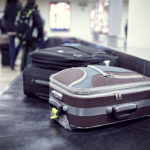[su_box title=”Keep in mind…” style”=”default”]
- There are many different types of travel insurance
- Travel insurance protects in case your luggage is lost or if you miss your plane
- You are not obligated to purchase travel insurance
[/su_box]
Like all insurance, travel insurance is designed to compensate the insured for a loss suffered and to reimburse the policyholder for all or part of the loss. It sounds complicated, but it isn’t.
In this case, the loss has to do with travel, and could be anything from disappearing luggage to costs incurred by:
- A medical emergency
- Cancelled trips
- Delays and interruptions when you travel
In each case, there is a financial value attached to the loss. A determination made at the time the policy is purchased as to what the financial burden would be if your luggage didn’t arrive when you did.
That’s where the reimbursement comes in, compensating you for your time and money expended to replace that new suit that’s on a journey without you.
Enter your zip code above to compare affordable health insurance near you!
When would I want travel insurance?

You’re sitting alone in an airline terminal baggage claim area, in a foreign country, staring at an empty carousel.
The new suit you bought for the presentation you’re scheduled to make tomorrow morning could be anywhere from Tokyo to Timbuktu, along with the rest of your clothing, save what’s on your back.
Well, if you made the decision to purchase travel insurance, you could recover some or all of the costs of your lost luggage.
Alternatively, if your luggage is merely late, arriving after your presentation, you could be reimbursed for the cost of the change of clothing you had to purchase.
Like the cavalry riding in to save the day, travel insurance steps in to take care of the unforeseen disaster that might otherwise ruin that business trip, family vacation, or second honeymoon.
Are there different types of travel insurance?
In shopping for travel insurance, you’ll find that the options are as varied as the many applications for your smart phone, so it’s important to understand their differences to ensure that your choice is the one that best fits your needs.
Travel insurance plans are sold in a variety of combinations, as medical plans, accident plans, or packages.
We can simplify the categories into one of two overall categories: those designed to cover the medical problems of an individual, and those that cover the physical problems of the journey.
Do I need medical travel insurance for sickness or injury?
Most health insurance plans, even the most comprehensive will provide little or no coverage when you travel, especially if you cross a border, leaving you at the mercy of the locals should become ill or injured while traveling.
Travel medical insurance fills the gap in coverage that exists when you take your personal health insurance on the road.
The insurance works much like at-home health insurance, providing emergency medical treatment and assistance in finding medical help.
The coverage includes both in and out-of-network coverage, deductibles, and co-payments, in which you’re familiar.
Many insurers also offer accidental death and dismemberment policies for serious injuries that result in dismemberment or death. As with most insurance plans, there are likely to be exclusions for:
- Pre-existing medical conditions
- War or acts of terrorism (although some plans have begun to offer limited coverage)
- Any injury or illness caused by alcohol or drug use by the policyholder
Should I buy travel insurance in case of trip interruption?
For all the other things that can go wrong, there is likely to be a travel insurance policy to reimburse the wise traveler.
Trip cancellation policies reimburse travelers when a trip is canceled under a variety of circumstances.
For example, that long-awaited family vacation to visit the ancestral homeland is days away, but one of the kids has the flu, and mom isn’t looking all that great either.
With some plans, you can cancel the trip, and recover as much as 125 percent of the cost of the trip, which may come in handy to pay additional cancellation fees from airlines and hotels.
If a hurricane bears down on your favorite resort, with travel insurance you can make the choice to stay home, and not have to eat the cost of the vacation.
If travel is canceled because an airline, cruise ship, or hotel has gone out of business, there are travel insurance policies to reimburse you. Other plans cover:
- Interrupted trips if an injury, illness, or other emergency force you to change plans
- Delays in traveling or missed connections that require additional lodging, meals, or additional travel costs
- Lost passports
- Sporting goods and other items
The list is as wide as can be imagined, with a policy likely to exist to cover any situation. Naturally, it’s best to have some idea in advance what coverage you’ll need, and establish a budget.
A good rule of thumb is that you may spend an additional five percent of the cost of your trip on travel insurance.
That may sound pricey, but that all depends on how you feel about staring at an empty baggage carousel.
Tie up loose ends before you travel! Use our FREE tool to compare health insurance quotes!
[su_spoiler title=”References:” icon=”caret-square” style=”fancy” open=”yes”]
- https://en.wikipedia.org/wiki/Travel_insurance
- http://www.hopkinsmedicine.org/healthlibrary/conditions/travel_medicine/what_to_do_if_you_get_sick_while_traveling_85,P01455/
- https://www.verywell.com/out-of-network-1738597
- https://en.wikipedia.org/wiki/Accidental_death_and_dismemberment_insurance
- http://lifehacker.com/do-i-really-need-to-buy-travel-insurance-1674681487
[/su_spoiler]




